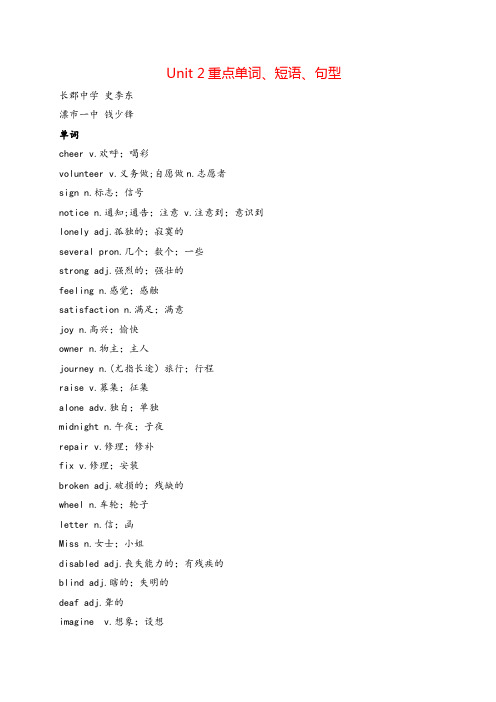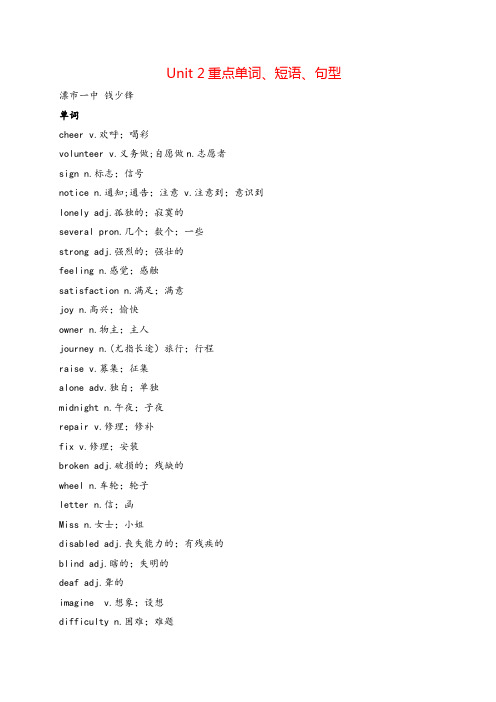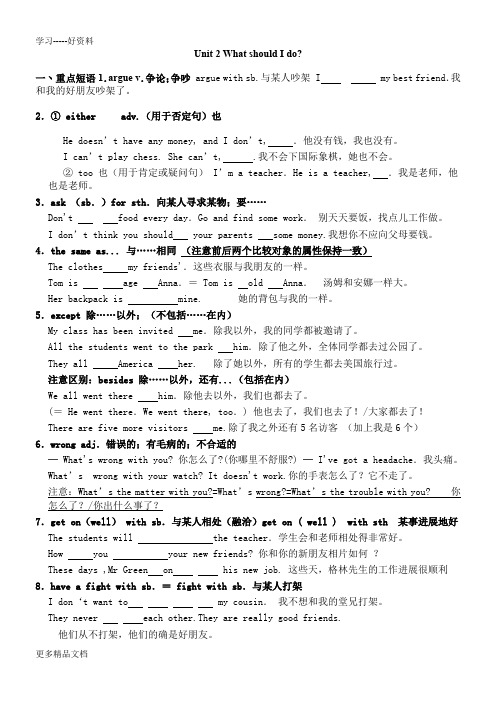人教版八年级下册第二单元unit2重点短语语法
- 格式:docx
- 大小:25.96 KB
- 文档页数:6

Unit 2重点单词、短语、句型长郡中学史李东漂市一中钱少锋单词cheer v.欢呼;喝彩volunteer v.义务做;自愿做n.志愿者sign n.标志;信号notice n.通知;通告;注意 v.注意到;意识到lonely adj.孤独的;寂寞的several pron.几个;数个;一些strong adj.强烈的;强壮的feeling n.感觉;感触satisfaction n.满足;满意joy n.髙兴;愉快owner n.物主;主人journey n.(尤指长途)旅行;行程raise v.募集;征集alone adv.独自;单独midnight n.午夜;子夜repair v.修理;修补fix v.修理;安装broken adj.破损的;残缺的wheel n.车轮;轮子letter n.信;函Miss n.女士;小姐disabled adj.丧失能力的;有残疾的blind adj.瞎的;失明的deaf adj.聋的imagine v.想象;设想difficulty n.困难;难题open v.开;打开door n.门carry v.拿;提;扛train v.训练;培训excited adj.激动的;兴奋的training n.训练;培训kindness n.仁慈;善良clever adj.聪明的;聪颖的understand v.理解;领会change v.& n.变化;改变interest n.兴趣;关注 v.使感兴趣;使关注sir n.先生madam n.夫人;女士短语clean up打扫(或清除)干净cheer up (使)变得更高兴;振奋起来give out分发;散发come up with想出;提出(主意、计划、回答等) put off推迟hand out 分发call up打电话给(某人);征召used to曾经……;过去……care for照顾;非常喜欢try out参加……选拔;试用fix up修理;装饰give away 赠送;捐赠take after (外貌或行为)像set up建起;设立make a difference 影;有作用句型.They told me stories about the past and how things used to be.他们给我讲过去的生活经历,讲过去是什么样子的。

人教版英语八年级下册第二单元知识点过关Unit 2 I ’ll help to clean up the city parks.一、重点短语1. Clean-Up Day 清洁日、大扫除2. an old people’s home 一家养老院3. help out with sth. 帮助解决困难;例如:What did they ask you to help out with他们叫你帮忙做什么?ed to 曾经…、过去;例如:I used to be a shy girl . 我过去是个害羞的女孩儿。
5.care for 关心、照顾;例如:Every year , the volunteers spend two months caring for the old in the old people’s home. 每年,志愿者们花两个月时间去养老院照顾老人。
6. the look of joy 快乐的表情;例如:The teacher was happy to see the look of joyon her students’ faces. 老师很高兴看到学生们脸上快乐的表情。
7. at the age of 在......岁时;例如:The little boy could dress himself at the age of three. 这个小男孩在三岁的时候就可以自己穿衣服了。
8.clean up 打扫(或清除)干净9. cheer up (使)变得更高兴;例如:Don’t be sad , cheer up , life is full of sunshine.不要悲伤了,高兴起来吧,生活充满了阳光。
10. give out 分发、散发,同义词hand out11. come up with 想出、提出;例如:The clever boy can always comes up some good ideas. 这个聪敏的男孩儿总能想出一些好主意。

人教版八年级下册Unit 2 I'll help to clean up the city parks.短语归纳1.hope to do sth 希望做某事2.clean up 打扫3.cheer sb up激励某人4.give out 分发5.food bank 食物库6.need to do sth 希望做某事e up with 想出8.from now 从现在开始9.put off 推迟10.put up张贴11.hand out 分发12.call up召集13.make a plan to do sth 制定一个做某事的计划ed to do 过去常常15.care for 关心16. a feeling of satisfaction 满足感17.the look of joy 喜悦的面孔18.at the age of 在某人几岁的时候19.decide to do sth 决定做某事20.try out 尝试21. go on a trip 旅行e true 实现23.at the same time 同时24.homeless people 无家可归的人25.write down写下26.fix up 修理27.give away 捐献28.take after 长得像29.in need 有需要30.be proud of 自豪31.not any more 不再32.get money 赚钱33.be busy with忙于某事34.at least 至少35.be sure 确信,无疑36.set up 建立37.disabled people 残疾人38.make sth possible 使...成为可能39.imagine doing sth想象做某事40.think about 思考,考虑41.have difficulties in doing sth在做某事上有困难42.answer the phone 接电话43.be difficult for sb对某人来说困难44.help out 帮助某人摆脱困境45. a trained dog经过训练的狗46.cheer sb up 激励某人47.be excited about 对...兴奋48.be able to能49.because of因为由于50.order sb to do sth命令某人做某事51.for example例如52.at once立刻,马上53.send sb sth送给某人某物54.send sth to sb把...送给某人55.change one’s life改变某人的生活56.write a letter to sb给某人写信57.be strong in在...强58.in one’s free time 在某人空闲时间59. a call-in center 热线电话中心60.work out 起作用。

八年级下册英语各单元重点短语+句型语法人教版1. Unit 1Important phrases:- get to know: I want to get to know my new classmates.- make friends with: I hope to make friends with some local students.- be interested in: She is interested in learning a new language.- take part in: Are you going to take part in the school talent show?- show off: Don't show off in front of your friends.- be proud of: I am proud of my brother for winning the race.Sentence patterns and grammar:- Present continuous tense: He is playing football in the park.- Comparative adjectives: My sister is taller than me.- Superlative adjectives: This is the best pizza I've ever tasted.2. Unit 2Important phrases:- turn off: Don't forget to turn off the lights before you leave.- set off: We will set off for the beach early in the morning.- look forward to: I am looking forward to the schooltrip next week.- get along with: I get along with my classmates very well.- break down: Our car broke down on the way to the airport.- run out of: We ran out of milk, so I need to go to the store.Sentence patterns and grammar:- Past continuous tense: They were playing basketball when the rain started.- Modal verbs: You should study harder for the exam.- Reported speech: She said that she was going to the movies.3. Unit 3Important phrases:- be strict with: My teacher is very strict with homework deadlines.- get into: She wants to get into a good university.- take care of: Don't forget to take care of your little brother.- be good at: I am good at playing the piano.- look up to: I look up to my older sister as a role model.- come up with: We need to come up with a plan for the project.Sentence patterns and grammar:- Future perfect tense: By next year, I will havefinished high school.- Present perfect continuous tense: She has been studying English for five years.- Conditional sentences: If I had known, I would have helped you.4. Unit 4Important phrases:- call for: This situation calls for a serious discussion.- hold on: Please hold on while I transfer your call.- look out: Look out for the car coming down the road.- put off: Don't put off until tomorrow what you can do today.- try out: I want to try out for the school basketball team.- fall apart: Our friendship fell apart after the argument.Sentence patterns and grammar:- Present perfect tense: I have finished my homework.- Past perfect tense: She had already left when I arrived.- Passive voice: The cake was made by my mom.5. Unit 5Important phrases:- set up: We need to set up the equipment for the presentation.- take off: The plane will take off in an hour.- go through: I will go through my notes before the exam.- look into: The police will look into the matter.- pick up: Can you pick up some milk on your way home?- be satisfied with: I am satisfied with my test results.Sentence patterns and grammar:- Future continuous tense: They will be having dinner at7 PM.- Reported questions: He asked her where she was goingfor the holidays.- Relative clauses: The boy who won the race is my friend.6. Unit 6Important phrases:- be proud of: She is proud of her achievements.- look after: My sister looks after our pet dog.- give up: Don't give up on your dreams.- make a decision: I need to make a decision about which college to attend.- put up with: I can't put up with his behavior any longer.- take after: My son takes after his father in terms of looks.Sentence patterns and grammar:- Past perfect continuous tense: She had been studying all night when her parents arrived.- Reported commands: He told her to clean her room.- Adverb clauses: I will call you when I get home.。

Unit 2重点单词、短语、句型漂市一中钱少锋单词cheer v.欢呼;喝彩volunteer v.义务做;自愿做n.志愿者sign n.标志;信号notice n.通知;通告;注意 v.注意到;意识到lonely adj.孤独的;寂寞的several pron.几个;数个;一些strong adj.强烈的;强壮的feeling n.感觉;感触satisfaction n.满足;满意joy n.髙兴;愉快owner n.物主;主人journey n.(尤指长途)旅行;行程raise v.募集;征集alone adv.独自;单独midnight n.午夜;子夜repair v.修理;修补fix v.修理;安装broken adj.破损的;残缺的wheel n.车轮;轮子letter n.信;函Miss n.女士;小姐disabled adj.丧失能力的;有残疾的blind adj.瞎的;失明的deaf adj.聋的imagine v.想象;设想difficulty n.困难;难题open v.开;打开door n.门carry v.拿;提;扛train v.训练;培训excited adj.激动的;兴奋的training n.训练;培训kindness n.仁慈;善良clever adj.聪明的;聪颖的understand v.理解;领会change v.& n.变化;改变interest n.兴趣;关注 v.使感兴趣;使关注sir n.先生madam n.夫人;女士短语clean up打扫(或清除)干净cheer up (使)变得更高兴;振奋起来give out分发;散发come up with想出;提出(主意、计划、回答等) put off推迟hand out 分发call up打电话给(某人);征召used to曾经……;过去……care for照顾;非常喜欢try out参加……选拔;试用fix up修理;装饰give away 赠送;捐赠take after (外貌或行为)像set up建起;设立make a difference 影响;有作用句型.They told me stories about the past and how things used to be.他们给我讲过去的生活经历,讲过去是什么样子的。

Unit 2 What should I do?一丶重点短语1.argue v.争论;争吵argue with sb.与某人吵架 I my best friend.我和我的好朋友吵架了。
2.① either adv.(用于否定句)也He doesn’t have any money, and I don’t,.他没有钱,我也没有。
I can’t play chess. She can’t, .我不会下国际象棋,她也不会。
② too 也(用于肯定或疑问句)I’m a teacher.He is a teacher, .我是老师,他也是老师。
3.ask (sb.)for sth.向某人寻求某物;要……Don't food every day.Go and find some work.别天天要饭,找点儿工作做。
I don’t think you should your parents some money.我想你不应向父母要钱。
4.the same as... 与……相同(注意前后两个比较对象的属性保持一致)The clothes my friends'.这些衣服与我朋友的一样。
Tom is age Anna.= Tom is old Anna.汤姆和安娜一样大。
Her backpack is mine. 她的背包与我的一样。
5.except 除……以外;(不包括……在内)My class has been invited me.除我以外,我的同学都被邀请了。
All the students went to the park him.除了他之外,全体同学都去过公园了。
They all America her. 除了她以外,所有的学生都去美国旅行过。
注意区别:besides 除……以外,还有...(包括在内)We all went there him.除他去以外,我们也都去了。
(= He went there.We went there, too.) 他也去了,我们也去了!/大家都去了!There are five more visitors me.除了我之外还有5名访客(加上我是6个)6.wrong adj.错误的;有毛病的;不合适的─ What's wrong with you? 你怎么了?(你哪里不舒服?) ─ I've got a headache.我头痛。
人教版八年级下册英语Unit 2知识点汇总一、常考短语clean up 打扫(或清除)干净cheer up(使)变得更高兴;振奋起来give out 分发;散发come up with 想出提出(主意、计划、回答等)put off 推迟hand out 分发call up 打电话给(某人);征召used to曾经……“;过去…care for照顾;非常喜欢try out参加………选拔;试用fix up修理;装饰give away赠送;捐赠take after(外貌或行为)像set up 建起;设立make a difference 影响;有作用put up 张贴;搭建;举起help out 帮助……摆脱困境give up 放弃come true 实现run out of 用尽;耗尽be similar to 与………相似volunteer to do sth 自愿做某事make plans to do sth 制订计划做某事ask sb (not) to do sth 要求某人(不要)做某事used to do sth 过去常常做某事give up+时间+to do sth腾出时间做某事get a feeling of 产生…的感觉decide to do sth 决定做某事help sb (to) do sth帮助某人做某事make a difference to对…产生影响make it possible for sb to do sth使得做某事对某人来说成为可能三、经典句型1.You could help to clean up the city parks. A(9)你可以帮助打扫城市公园。
(1)could意为“能;可以”,其后接动词原形,可以用于提出建议,语气比can委婉。
You could walk to the park.你可以步行去公园。
拓展:could表示过去的能力时,是can的过去式。
Unit2WhatshouldIdo?一丶重点短语1.arguev.争论;争吵arguewithsb. 与某人吵架Imybestfriend .我和我的好朋友吵架了。
2.①either adv.(用于否定句)也Hedoesn’thaveanymoney,andIdon ’t,.他没有钱,我也没有。
Ican ’tplaychess.Shecan ’t,.我不会下国际象棋,她也不会。
②too 也(用于肯定或疑问句)I’mateacher.Heisateacher, .我是老师,他也是老师。
3.ask(sb.)forsth .向某人寻求某物;要⋯⋯Don'tfoodeveryday .Goandfindsomework .别天天要饭,找点儿工作做。
Idon’tthinkyoushouldyourparentssomemoney. 我想你不应向父母要钱。
4.thesameas... 与⋯⋯相同(注意前后两个比较对象的属性保持一致)Theclothesmyfriends' .这些衣服与我朋友的一样。
TomisageAnna.=TomisoldAnna .汤姆和安娜一样大。
Herbackpackismine. 她的背包与我的一样。
5.except 除⋯⋯以外;(不包括⋯⋯在内)Myclasshasbeeninvitedme .除我以外,我的同学都被邀请了。
Allthestudentswenttotheparkhim .除了他之外,全体同学都去过公园了。
TheyallAmericaher. 除了她以外,所有的学生都去美国旅行过。
注意区别:besides 除⋯⋯以外,还有... (包括在内)Weallwenttherehim .除他去以外,我们也都去了。
(=Hewentthere .Wewentthere,too .)他也去了,我们也去了!/大家都去了!Therearefivemorevisitorsme. 除了我之外还有5名访客(加上我是6 个)6.wrongadj.错误的;有毛病的;不合适的─What'swrongwithyou? 你怎么了?(你哪里不舒服?) ─I'vegotaheadache.我头痛。
八年级英语下册Unit2短语汇总(人教新目标)八年级英语下册Unit2短语汇总Unit2I’llhelptocleanupthecitypars.一、重点短语clean-UpDay清洁日anoldpeople’shoe养老院helpoutithsth.帮助解决困难usedto曾经……;过去_carefor关心;照顾thelooofjoy快乐的表情attheageof在......岁时cleanup打扫干净cheerup变得更高兴;振雀0.giveout分发;散发1.eupith想出;提出aeaplan制订计划3.aesoenotices做些公告牌tryout试用;试行orfor为…工作;为….效力putup建造;举起;张贴handout分发;散发;发给callup打电话;召集putoff推迟;延迟0.forexaple比如;例如1.raiseoney筹钱;募捐2.taeafter与......相像;像3.giveaay赠送;捐赠fixup修理;修补;解决besiilarto与……相似setup建立;设立;成立disabledpeople残疾人aeadifference影响;有作用beableto能够0.after-schoolreadingprogra课外阅读项目otherays其他的方法oneday某一天3.soeday某一天giveup放弃futuredreajob将来的理想工作afeelingofsatisfaction满足感attheageof在......岁时tryout尝试etrue实现atthesaetie同时0.bebusyith忙于......1.inhisfreetie在他的空闲时间2.beorriedabout着急3.achildren’shoe儿童之家4.interestsandhobbies兴趣和爱好beunabletodosth.不能够做......anoldpeople’shoe老年之家thevolunteerjob志愿工作bestrongin...在......突出befreetodosth.有空做某事0.oroutfine发展好;结果好1.putup张贴二、重点句型Theboycouldgiveoutfoodatthefoodban.这个男孩可以在食品救济站分发食物。
一丶重点短语 1.argue v.争论;争吵 argue with sb.与某人吵架 I argued with my best friend.我和我的好朋友吵架了。 2.① either adv.(用于否定句)也 He doesn’t have any money, and I don’t, either.他没有钱,我也没有。 I can’t play chess. She can’t, either.我不会下国际象棋,她也不会。 ② too 也(用于肯定或疑问句) I’m a teacher.He is a teacher, too.我是老师,他也是老师。 3.ask (sb.)for sth.向某人寻求某物;要„„ Don't ask for food every day.Go and find some work.别天天要饭,找点儿工作做。 I don’t think you should ask your parents for some money.我想你不应向父母要钱。 4.the same as... 与„„相同(注意前后两个比较对象的属性保持一致) The clothes are the same as my friends'.这些衣服与我朋友的一样。 Tom is the same age as Anna.= Tom is as old as Anna. 汤姆和安娜一样大。 Her backpack is the same as mine. 她的背包与我的一样。 5.except 除„„以外;(不包括„„在内) My class has been invited except me.除我以外,我的同学都被邀请了。 All the students went to the park except him.除了他之外,全体同学都去过公园了。 They all traveled America except her. 除了她以外,所有的学生都去美国旅行过。 注意区别:besides 除„„以外,还有...(包括在内) We all went there besides him.除他去以外,我们也都去了。 (= He went there.We went there, too.) 他也去了,我们也去了!/大家都去了! There are five more visitors besides me.除了我之外还有5名访客(加上我是6个) 6.wrong adj.错误的;有毛病的;不合适的 ─ What's wrong with you? 你怎么了?(你哪里不舒服?) ─ I've got a headache.我头痛。 What’s wrong with your watch? It doesn't work.你的手表怎么了?它不走了。 注意:What’s the matter with you?= What’s wrong with you ?=What’s the trouble with you? 你怎么了?/你出什么事了? 7.get on(well) with sb.与某人相处(融洽) get on ( well ) with sth 某事进展地好 The students will get on well with the teacher.学生会和老师相处得非常好。 How are you going on with your new friends? 你和你的新朋友相片如何? These days ,Mr Green gets on well with his new job. 这些天,格林先生的工作进展很顺利 8.have a fight with sb.= fight with sb.与某人打架 I don‘t want to have a fight with my cousin.我不想和我的堂兄打架。 They never fight with each other.They are really good friends. 他们从不打架,他们的确是好朋友。 二、主要句型(Key Sentences Structures) What should I do? You could write him a letter. What should he do? Maybe he should say sorry to him What should they do? They shouldn't argue. 三、词语辨析 1. borrow sth. from sb. 从某人处借进某物(借回来) lend sth. to sb. = lend sb. sth 把某物借给某人(借出去) 注: borrow sth. from sb. 是指该句的主语从别人处(往里)借进某物 例:He borrowed the dictionary from Lucy yesterday. 他昨天从露西处借了那本字典. lend sth. to sb. = lend sb. sth. 是指该句的主语把某物(往外)借给别人用 例如:Could you lend me your car? =Could you lend your car to me? 请你借给我你的车用一下好吗? 2. ①get sb. to do„ 使„„做(以人为对象时,有“说服„„使做„„”的含义) He could get a tutor to come to his home. 他可以请一位家庭教师来他家。 You’ll never get her to agree. 你决不可能使她同意。 ②ask sb. to do„ 邀请(人)做„„ We asked her to come to our party.我们请她来参加聚会 ③ tell sb. to do„让某人做某事 例如: The teacher told him to finish the work that day. 老师那天让他完成那项工作。 3、be in style 时髦的,流行的 be out of style 过时的,不时髦的 例: Look! Her new dress is in style.她的新裙子很时髦。 Those clothes are out of style. 那些衣服过时了。 四、课文解释 1、I don‘t want to surprise him. 我不想让他感到意外。 此处surprise是及物动词 surprise sb. 使某人感到吃惊 eg. My friend always surprises me. 2、talk about it on the phone 用电话就此事进行交流 On the phone 在电话里。不能使用 in the phone、 eg. They talk about a lot on the phone yesterday. 他们昨天在电话里谈了很多 3、call sb. (up) =give sb. a call 给某人打电话 4、write sb. a letter = write a letter to sb. 给某人写信 5、give him a ticket to a ball game.给他一张观看球赛的入场券 (注意to 译为:...的) eg. They got two tickets to tonight’s show. 他们搞了两张今晚表演的入场券。 6、She has the same haircut as I do. 她和我有相同的发型。 eg. Tim has the same clothes as his brother does.提姆和他的弟弟有相同的衣服。 7、find out (经过某人的研究、努力)发现,查出,找出 You should find out the answer for yourself.你应该自己去找答案。 8、Everyone else in my class was invited except me. 除了我以外,我们班其他别的人都接到了邀请(信) 此句中else一词不能单独使用,它必须跟在不定代词像“someone, anyone nobody”等词的后面,或跟在特殊疑问词像“what, where”等词的后面使用意思是“别的” eg. What else 别的什么, Who else 其他谁 someone else 其他人 9、I can’t think what I did wrong. 我真想不出我做错了什么。 此句中 what I did wrong是宾语从句,应用陈述语序(即:主语+动词) 10、I’m very upset and don’t know what to do.我很沮丧,不知该干什么。 此句中 what to do是不定式作know的宾语,可用宾语从句来代替。可以说成“I don’t know what I should do.” 请背熟以下两个常见结构: I don’t know what to do .我不知道该做什么。 I don’t know how to do it. 我不知道该怎么去做它。 11、There are a lot of things you could do. 有许多你能做的事。 此句中 you could do是定语从句,修饰前面的名词“things” 12、You left your homework at home.你把你的作业落在家里了。 leave sth. +介词短语,是“把„„忘在,落在(某处)的意思。 eg. He left his umbrella on the bus.他把伞忘在公交车上。 注:千万不能根据汉语的说法写为:forget sth ,只能用leave sth.’表示“落下” 13、You should try to be funny. 你应该试着幽默一些。 Try to do„努力做,试着做,尽量做 而try not to do 是尽量不做„„ eg. Please try not to be late again. 请尽量不要再迟到。 14、Their school days are busy enough. 他们的学校生活是够忙的。 enough必须放在形容词/副词的后面,表示“足够„„的”(后置) eg. He is tall enough to reach that apple. 他足够高的可以够着那个苹果。 15、be under too much pressure. 在太多的压力下 16、see other children doing a lot of things 看别的孩子在做许多事 see sb. doing 看见某人正在干某事(强调动作正在进行) See sb do sth 看见某人做过某事(强调动作已结束) eg. We saw them playing basketball at that time.那时我们看见他们在打篮球 17、find it hard to do sth. 发现做„„(事)很难 He found it hard to learn math well. 他发现学好数学很难 注:it 初中阶段常作:形式主语 /形式宾语,而句子真正的主语/宾语则由to do 来担当. 一、介词按其构成可分为: 1. 简单介词 at, in, on, to, since, until等。如: He's worked there since 1998. 2. 复合介词 into, onto, out of等。如: She is out of school. 她毕业了。 3. 二重介词 from under, from behind, from out of, until after, except in等。如: I'm from out of town. 我是从城外来的。 4. 短语介词 because of, instead of, in spite of等。如: I went back not because of the rain, but because I was tired.我回去不是因为下雨,而是因为我累了。 二、介词的作用: 1. 表示地点: after, along, at, below, by, of, near, over, through, under等。如: Near the village the boys are skating on the ice. 男孩子们正在村子附近的冰上滑冰。 They lay down under the shade of a tree. 他们躺在一棵树的树阴下。 2. 表示时间: about, after, across, at, during, for, in, of, till, until等。如: After class he will tell us about the accident. 课后他将告诉我们有关事故的情况。 A heavy rain has been falling across three days. 一场大雨下了整整三天。